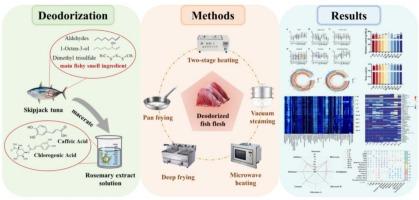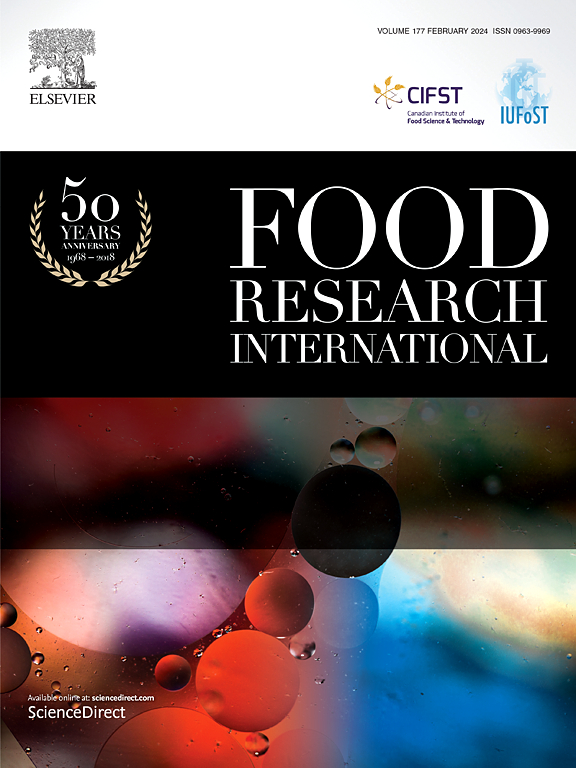鲣鱼肉饼的风味和品质提升:迷迭香萃取物除臭和热处理的协同作用
IF 8
1区 农林科学
Q1 FOOD SCIENCE & TECHNOLOGY
引用次数: 0
摘要
本研究研究了迷迭香提取物(RE)脱臭与两段加热、真空蒸煮、油炸、煎炸和微波加热五种热处理方法对鲣鱼肉饼理化和风味特性的影响。结果表明,稀土处理显著改善了织构柔软度和保湿性,特别是在两段加热(RE-90)时,其保水能力增强,硬度降低。真空蒸处理(RE-S)获得了最佳的结构完整性和水化性能。感官评价显示,RE-P(煎锅)组获得了最高的总体喜欢度,这归因于外观、香气和口感的平衡。风味实验结果表明,稀土能有效抑制鱼腥味中己醛和1-辛烯-3-醇等关键气味物质,同时保留鱼腥味增强挥发物。RE-S组表现出最有效的除臭效果,己醛和壬醛分别减少89.67%和72.73%,同时鲜味强度最高(98.53)。RE-P组的中度美拉德反应产物有助于其丰富的香气特征。相关分析进一步表明,较高的水分含量有利于鲜味化合物的保存和释放,从而增强了鲣鱼肉饼的鲜味。迷迭香提取物与适当的热处理工艺相结合,不仅优化了鲣鱼肉饼的风味和质地,而且为海鲜类预制食品的风味精确控制提供了理论依据。本文章由计算机程序翻译,如有差异,请以英文原文为准。

Flavor and quality enhancement of skipjack tuna patties: Synergistic effects of rosemary extract deodorization and thermal processing
This study investigated the effects of rosemary extract (RE) deodorization combined with five thermal processing methods (two-stage heating, vacuum steaming, deep-frying, pan-frying, and microwave heating) on the physicochemical and flavor characteristics of skipjack tuna patties. The results showed that RE treatment significantly improved texture softness and moisture retention, particularly in the two-stage heating (RE-90), which exhibited enhanced water-holding capacity and lower hardness. Vacuum steaming treatment (RE-S) yielded the best structural integrity and hydration performance. Sensory evaluation showed that the RE-P (pan-frying) group received the highest overall liking, attributed to a balance of appearance, aroma, and mouthfeel. Flavor results indicated that RE effectively suppressed key fishy odorants such as hexanal and 1-octen-3-ol, while preserving flavor-enhancing volatiles. The RE-S group demonstrated the most effective deodorization, with reductions of 89.67 % in hexanal and 72.73 % in nonanal, alongside the highest umami intensity (98.53). Moderate Maillard reaction products in the RE-P group contributed to its rich aroma profile. Correlation analysis further revealed that a higher moisture content facilitated the preservation and release of umami compounds, thereby enhancing the umami taste of skipjack tuna patties. The combination of rosemary extract and appropriate thermal processing not only optimized the flavor and texture of skipjack tuna patties but also provided a theoretical basis for precise flavor control in seafood-based prepared foods.
求助全文
通过发布文献求助,成功后即可免费获取论文全文。
去求助
来源期刊

Food Research International
工程技术-食品科技
CiteScore
12.50
自引率
7.40%
发文量
1183
审稿时长
79 days
期刊介绍:
Food Research International serves as a rapid dissemination platform for significant and impactful research in food science, technology, engineering, and nutrition. The journal focuses on publishing novel, high-quality, and high-impact review papers, original research papers, and letters to the editors across various disciplines in the science and technology of food. Additionally, it follows a policy of publishing special issues on topical and emergent subjects in food research or related areas. Selected, peer-reviewed papers from scientific meetings, workshops, and conferences on the science, technology, and engineering of foods are also featured in special issues.
 求助内容:
求助内容: 应助结果提醒方式:
应助结果提醒方式:


